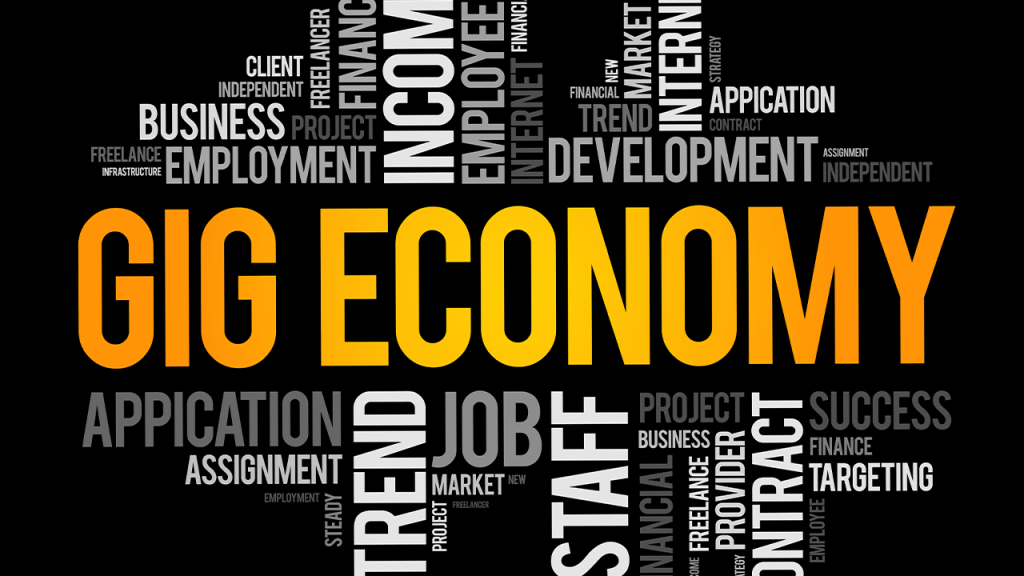The gig economy has rapidly transformed the landscape of work, offering flexible job opportunities for many Americans who value autonomy and the ability to set their own schedules. This shift has enabled individuals to pursue diverse income streams, from ridesharing and food delivery to freelance digital services.
However, as this trend continues to grow, its impact on financial stability and security remains a topic of intense debate and analysis. Concerns surrounding inconsistent income, lack of traditional benefits like healthcare and retirement savings, and limited legal protections for gig workers have sparked discussions about the need for regulatory reforms and innovative support systems to ensure equitable opportunities within this evolving labor market.
Understanding the gig economy

At its core, the gig economy refers to a labor market characterized by short-term contracts or freelance work, as opposed to permanent jobs. This model is powered by digital platforms like Uber, Lyft, and Airbnb, which connect workers with job opportunities on-demand. Over the past decade, this flexible work arrangement has blossomed, with millions of Americans participating in various forms of gig work.
The gig economy is reshaping how people think about employment, offering an alternative to the 9-to-5 work culture. It allows individuals to become their own bosses, manage their work-life balance better, and pursue passions. However, the unpredictability of income, lack of employee benefits, and potential for overwork without additional compensation also cast shadows on the otherwise promising aspects of gig work.
Financial opportunities and challenges
One of the significant benefits of gig work is the opportunity to earn money quickly and outside traditional employment constraints. For many, this represents a lucrative supplementary income stream alongside primary jobs, or a way to make ends meet between full-time positions.
However, while appealing, this financial flexibility comes with inherent risks. Gig workers often face income volatility, as work availability can fluctuate, impacting consistent earnings. Unlike traditional employees who receive a steady paycheck, freelancers experience periods of feast and famine, making budget planning challenging.
The role of technology
Technology plays a pivotal role in the gig economy, serving as the infrastructure that supports this employment model. Digital platforms have democratized access to work, enabling people from various geographical and socio-economic backgrounds to connect with job opportunities they might not have accessed otherwise. These platforms facilitate not only work-search efficiency but also provide tools for managing tasks, setting rates, and even securing payment.
The convenience and connectivity offered by technology have driven the gig economy’s expansion and allowed it to thrive in a digital-first society. However, reliance on these platforms also introduces challenges, such as fees that cut into earnings and platform-specific rules that freelancers must navigate. Additionally, data-driven algorithms control work distribution, which can lead to aforementioned income variability.
Impact on long-term financial security
The implications of the gig economy on long-term financial security are profound. While it offers immediate work opportunities, questions remain about how it aligns with the financial needs of life’s later stages. Without the safety net of employer-sponsored retirement plans and healthcare benefits, gig workers may have to rely solely on their savings and investments to support their future.
This necessitates a proactive approach to financial planning, where gig workers must create retirement savings strategies independently. It involves seeking out Individual Retirement Accounts (IRAs) or other investment vehicles to build wealth over time. Furthermore, the issue of social security contribution for freelancers, who must pay self-employment tax, adds to the complexity of preparing for the long haul.
Adapting to a changing job market
As the job market inexorably shifts towards gig and freelance work, both workers and policymakers must adapt to these changes. For individuals, investing in skill development becomes vital, as the gig economy favors specialized skills. This need for continuous learning helps individuals remain competitive and find better-paying gigs that contribute to financial stability.
Additionally, a cultural shift in how society perceives gig work versus traditional employment could impact the regulations governing freelance work, prompting the introduction of new labor laws and protections tailored to this workforce. This might include initiatives to offer gig workers portable benefits or legal structures to standardize contracts and payment terms.
Navigating personal finance in the gig landscape
The responsibility for financial stability in the gig landscape often lies with the individual. As such, mastering personal finance becomes critical. Gig workers should prioritize creating a financial safety net to shield against income uncertainties. Building an emergency fund, diversifying income streams, and investing in insurance are essential steps toward achieving financial resilience.
Moreover, adopting a mindset of continuous financial improvement can help gig workers navigate the complexities of freelance work. This involves not just income management but also leveraging technology to track expenses, set budget goals, and plan for taxes. Utilizing apps and online resources dedicated to personal finance for freelancers can offer valuable assistance in this effort.
